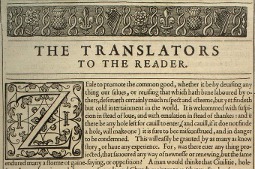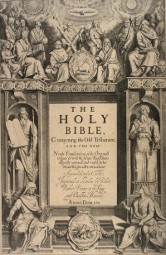The Preface, Part 5: Is it Really an Embarrassment to the KJVO Movement?
 Republished with permission from Theologically Driven. (See also: previous installments in this series.)
Republished with permission from Theologically Driven. (See also: previous installments in this series.)
The Federalist Papers are a series of 85 essays supporting the ratification of the United States Constitution, written by Alexander Hamilton, James Madison, and John Jay. Madison himself is commonly known as the Father of the Constitution. Federal judges, when interpreting the Constitution, frequently appeal to the Federalist Papers as a contemporary account of the intentions of the authors.
In a recent Wall Street Journal article, Peter Berkowitz observes:
Most astonishing and most revealing is the neglect of The Federalist by graduate schools and law schools. The political science departments at Harvard, Yale, Princeton, Stanford and Berkeley—which set the tone for higher education throughout the nation and train many of the next generation’s professors—do not require candidates for the Ph.D. to study The Federalist.
I think there may be a parallel with the Preface to the King James Version, The Translators to the Reader. If one wishes to understand the KJV, the purposes and intents of the translators themselves, the Preface is the authoritative source. And what it reveals is the exact opposite of the claims made for the KJV by those in the KJV-only movement. The KJV-only position argues that only the KJV is the perfect Word of God without any error. It is no wonder, then, that KJV-only advocates purposely avoid the Preface since it is an embarrassment to their false claims.
Discussion
The Preface, Part 4: Marginal Notes in the King James Version
 Republished with permission from Theologically Driven. (See also: previous installments in this series.)
Republished with permission from Theologically Driven. (See also: previous installments in this series.)
The King James-only view argues that only the 1611 KJV is the Word of God in English. All other versions or translations are so corrupt that they are not to be used, nor be appealed to as the Word of God. Most KJV-only advocates contend that the printed Greek text from which the KJV was translated, commonly called the Textus Receptus (TR), is inspired and inerrant, and the KJV is the only translation that accurately translates the TR. But this is not true. The New King James Version (NKJV) is also translated from the TR. Being TR based, the NKJV cannot so easily be discounted by KJV-only proponents. Therefore, they seek to find other ways to disqualify the NKJV.
A common complaint against the NKJV by KJV-only advocates is the use of notes provided by the translators. For example, D. A. Waite says:
The diabolical nature of the New King James Version shows itself in their printing all the various readings of the Greek text in the footnotes. They print all sides and take their stand in favor of none of them. By so doing, they confuse the readers. The editors have made no decision as to what God’s Words really are (Defending the King James Bible, p. 125).
William P. Grady sounds a similar warning:
Discussion
The Preface and the KJV's Exclusivity and Authority
 Republished with permission from Theologically Driven.
Republished with permission from Theologically Driven.
Is Only the King James Version the Word of God?
The King James-only movement refuses to recognize any other translation in English as the Word of God. As I noted in previous posts here and here, the Preface to the 1611 KJV is an embarrassment to the KJV-only position because in the Preface the translators themselves absolutely reject the erroneous idea that any translation has such a unique position. Unlike modern KJV-only advocates, the translators themselves admired the work of previous translators of the English Bible.
And to the same effect say we, that we are so far off from condemning any of their labours that travailed before us in this kind, either in this land, or beyond sea, either in King Henry’s time, or King Edward’s, (if there were any translation, or correction of a translation, in his time) or Queen Elizabeth’s of ever renowned memory, that we acknowledge them to have been raised up of God for the building and furnishing of his Church, and that they deserve to be had of us and of posterity in everlasting remembrance.
Discussion
The Preface and Opposition to New Translations

In a previous post I noted that the Preface to the 1611 King James Version is an embarrassment to KJV-only advocates because in it the translators of the KJV make a series of statements that argue against the KJV-only position. Since KJV-only proponents insist that only the KJV is the Word of God in English, they are radically opposed to any English translation produced in the last 400 years.
Prior to the KJV, there had been many English translations of Bible: Wycliffe (1382), Tyndale (NT, 1526), Coverdale (1535), Matthew’s Bible (1537), the Great Bible (1539), the Geneva Bible (1560), the Bishops’ Bible (1568), and the Douai-Rheims (1609–10). Since these and other translations were already available in 1611, the translators of the KJV believed there would be hostility to their new translation, and so they were quick to address the issue in the Preface:
Zeal to promote the common good, whether it be by devising anything ourselves, or revising that which hath been laboured by others, deserveth certainly much respect and esteem, but yet findeth but cold entertainment [reception] in the world. It is welcomed with suspicion instead of love, and with emulation instead of thanks: and if there be any hole left for cavil [trivial objection] to enter, (and cavil, if it do not find a hole, will make one) it is sure to be misconstrued, and in danger to be condemned. This will easily be granted by as many as know story [history], or have any experience. For was there ever any thing projected, that savoured any way of newness or renewing, but the same endured many a storm of gainsaying or opposition?
This, and more to this purpose, his Majesty that now reigneth…knew full well, according to the singular wisdom given unto him by God, and the rare learning and experience that he hath attained unto; namely, that whosoever attempteth any thing for the publick, (specially if it pertain to religion, and to the opening and clearing of the word of God) the same setteth himself upon a stage to be glouted [frowned] upon by every evil eye; yea, he casteth himself headlong upon pikes [spears], to be gored by every sharp tongue. For he that meddleth with men’s religion in any part meddleth with their custom, nay, with their freehold [an estate or office held for life]; and though they find no content in that which they have, yet they cannot abide to hear of altering.
Many men’s mouths have been open a good while (and yet are not stopped) with speeches about the translation so long in hand, or rather perusals of translations made before: and ask what may be the reason, what the necessity, of the employment. Hath the Church been deceived, say they, all this while?…Was their translation good before? Why do they now mend it? Was it not good? Why then was it obtruded [thrust upon] to the people?
Discussion
The Embarrassing Preface to the King James Version
 Republished with permission from Theologically Driven.
Republished with permission from Theologically Driven.
When the King James Version of the Bible came off the press of Robert Barker in 1611, it contained an eleven-page preface titled “The Translators to the Reader.” This preface is primarily a defense of the new translation, but it also provides important information about the translators’ views on the subject of Bible translation. It is an embarrassment (or should be) to King James-only advocates because it contains statements from the translators that are in direct opposition to the KJV-only position. It is most unfortunate that this preface is no longer included in modern copies of the KJV. This post is the beginning of a series that will examine the actual words of the preface in order to refute the erroneous ideas of KJV-only movement with the words of the translators themselves. But before beginning that examination, I will summarize the contents of the preface.
The preface begins by noting, along with examples, that all new endeavors of whatever kind will commonly face opposition. This is also true for persons who attempt to change and improve anything, even if they are important people like kings. However, the greatest opposition and severest vilification is reserved for those who modify or change the current translation of the Bible, even if that translation is known to have defects.

Discussion